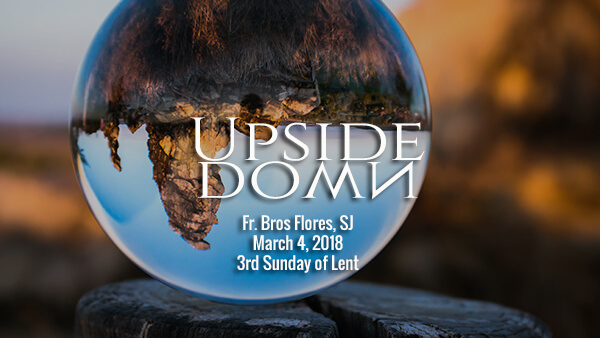


Fr. Bros Flores, SJ
3rd Sunday of Lent
March 4, 2018
The First Reading enumerates what we now call the Ten Commandments. Throughout the centuries, these commandments have been codified into a complex compliance checklist of 613 do’s-and-don’ts that have rendered the life of every devout Jew more burdensome and following the Ten Commandments more difficult.
The second reading today describes the crucified Christ as a stumbling block to Jews and foolishness to Gentiles. Jews seek the sign that their ancestors prophesied. And Jesus, this son of a carpenter who loves dining with sinners, attracts the undesirables in the society and keeps odd men of lowly stature around him. Obviously, Jesus, for the Jews failed that sign. The Gentiles, on the other hand, esteem wisdom. And Jesus, this itinerant preacher, falls off the Gentiles’ wisdom radar.
In a rare occasion, we hear an angry Jesus in the Gospel today. No, it is not just ordinary anger but perhaps we can say, enraged. Jesus is so angry that he makes a whip out of cords, drove all vendors out of the temple, and spilled the moneychangers’ coins. This is a behavior that is quite uncharacteristic of the Jesus we have been taught: loving, merciful, kind, understanding, and forgiving. And this furious image of Jesus does not fit into any of our God-categories. How then should we understand the law and Jesus?
There is this phrase in the Gospel today that might be the key to understanding Jesus and the law in the readings today: Jesus overturned the moneychangers’ tables. Overturned the tables—Turning the tables upside down.
I am reminded of this odd restaurant along Katipunan Extension (it is a few meters away from the P. Tuazon-Katipunan extension when you are coming from Ateneo de Manila). The restaurant’s façade is a Swiss chalet turned upside down. You might think this is all. No, it is complete with a red land rover 4×4 Defender 90, a bicycle, plant boxes, and even signs – all inverted! And you have not gotten enough yet. Its interior surprises you even more. From the ceiling (yes, the normal ceiling) hangs a sala set and dining chairs and table complete with plates and glasses!!!
While most diners are oblivious of the unique set-up, the anxiously-making-a-mountain-out-of-a-mole-hill person like me gets frantic. What if those furniture (including the bike and the Land Rover at the façade) break free from the fasteners that keep them from defying gravity? Yet, one has to strive harder (and to strain his neck as well) to gain that rare perspective—to see the world upside down! There is an insight gained when we see the “normal” world upside-down! And one has to see it personally to appreciate it.
When “down is up and up is down,”[1] and the Holy One of God walks with the impure and the sinful, we encounter Jesus and his mission, not as the Jews and the Gentiles saw but as the Father intends. And the Law no longer becomes burdensome but as the Psalmist acclaims today, perfect and refreshing the soul. By overturning the moneychangers’ tables, Jesus desires that the people see what he sees. You are more than what you have become. There is more to life than what meets the eye. Stop wasting your lives in anything fleeting.
Come to think of this. When God created the world (including everything in it), God saw it very good. This is the original perspective. Sin however distorted our view, blurred our vision, and turned everything upside down. The letter of the law is the final arbiter instead of the spirit of the law. Forgetting to whom it is dedicated, temple offering and the business that goes with it becomes the end in itself. Prestige, power, and property define humanity’s identity.
Our Lenten practices, like what Jesus did to the money changers’ tables, overturn what sin has turned upside down in order to reclaim the original God-perspective. Fasting and abstinence turn deprivation into sufficiency. Carving extra time out of our busy schedule to pray does not waste our precious time away; rather it makes us more efficient and productive. Giving is no longer about losing but gaining.
On this third week of Lent, let us overturn what sin has turned upside down and reclaim the God-perspective.
[1] Horacio de la Costa, “Too Good to be False, ” The Guidon, http://www.theguidon.com/1112/main/2017/12/too-good-to-be-false/